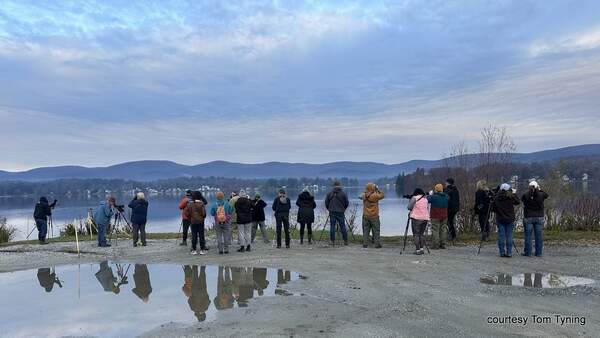Pittsfield Task Force Investigating Privatizing Water/Wastewater Systems
 The task force held its first meeting on Thursday afternoon. The task force held its first meeting on Thursday afternoon. |
PITTSFIELD, Mass. — A five-member task force has begun researching the possibility of privatizing the city's water and waste-water systems.
On Thursday, the group consisting of former Commissioner of Public Utilities William Forestell, William Sturgeon, Robert Meyers, Director of Community Development Douglas Clark and Connell held their first meeting.
"I just want to see if it is financially within our realm to do this and whether it will make sense for the city," Connell said.
Connell said the city has some heavy financial burdens forthcoming with the waste-water system including an estimated $40 million in capital expenses to comply with state regulations.
The waste-water treatment center and water system is just one area Connell is planning to explore privatization.
"This is one area of the city I would like to look at. There are other areas that I will probably be introducing later this year that we have control of," Connell said. "Because of the long-term cost we have with these operations, it is worthwhile looking for someone else to handle it?"
The group has a large task in front of it that will ultimately lead to a report and recommendation to the City Council and mayor. Members plan to look at the financials for all aspects of the system, state regulations, and feasibility.
Forestell says this is the third time the city has examined the possibility that he could remember. In both previous times — once in the 1980s and once in the 1990s — it was determined that it was better for the city to maintain control.
What rose to the top in those previous examinations was that private contracts were built to grow over time and grew more than the city would have done on its own. Forestell said he ran the numbers over a period of time on a contract developed for a similar community and compared it to the annual changes in city budgets. He found the private contract to be more expensive over the long term..
"It is not going to be a reduction of cost. It may be a reduction in cost initially but I think what you are going to find is there are escalators in these contracts," Forestell.
But there are many differences from then and now. One example is postemployment benefits (retirement, insurance). During earlier investigations, the postemployment benefits and liabilities didn't factor much into the discussion, according to Connell. Now those liabilities carry more weight.
"I think we can get a more accurate picture now than we could a few years back," he said.
Another aspect is that in the private sector, health care and pension plans are typically less expensive for the managing company, he said.
"That's obviously a concern because those types of benefits, if we were to go to a firm and privatize, we could end them at a certain point moving forward," Connell said.
Whatever contract is developed through a six- to eight-month procurement process — if privatization is the preferable way — will be very complicated. The city has sewer system that extends into neighboring towns, the system pulls water from numerous dams and reservoirs, there are control stations and then there is the treatment plant itself.
 City Council Vice President Christopher Connell is heading the investigation and was elected chair of the task force. City Council Vice President Christopher Connell is heading the investigation and was elected chair of the task force. |
"There is a list of those things that will vary between public and private sector," Clark said of the comparison and particularly separated the needed capital repairs from the operations.
He added that cities and towns currently get better bond rates for capital repairs, which could be a factor in considering a private contract. Connell said on the operations side, there may be benefits for companies in licensing and management because they run the systems for more than one municipality.
Parsing all of the different areas of operation is not something the committee currently thinks is the best. At this point, the wholesale operation and management of the system would be less complicated, they said.
However, even with a company taking over the entire operation, the city will still need to provide some oversight.
"Personally, I'd look at water and waste water as almost a public safety type thing," Forestell said of the oversight needed. "I would rather not have a contractor in the last five years of the contract trim the costs by not fixing this or not fixing that."
Privatizing services has been done before, most notably with trash pickup. The city once ran itsown trash pick up but had switched to contracting with an outside source. The city used to dispose of the sludge from the waste-water treatment plant but now contracts that out. There was a recent debate in the school system about privatizing buses and it was determined by the City Council that operating that system was better.
"The city has privatized certain things and contracted out certain things. But once you get into a private contract [for water] you are in one big contract. You don't rebid it every three years," Forestell said of the comparison.
Sturgeon said that the group can't just look at finances but "look at the whole picture."
After an hour of conversation outlining issues to examine, the committee agreed that they'd like to first speak with current Commissioner of Public Utilities Bruce Collingwood about the capital needs. And they would like to speak with Tom Landry, who operated the plant for a number of years. In the meantime, each member is planning on looking for information resources and literature to bring to the table.
Tags: privatization, wastewater, water system,
 The task force held its first meeting on Thursday afternoon.
The task force held its first meeting on Thursday afternoon. City Council Vice President Christopher Connell is heading the investigation and was elected chair of the task force.
City Council Vice President Christopher Connell is heading the investigation and was elected chair of the task force.














